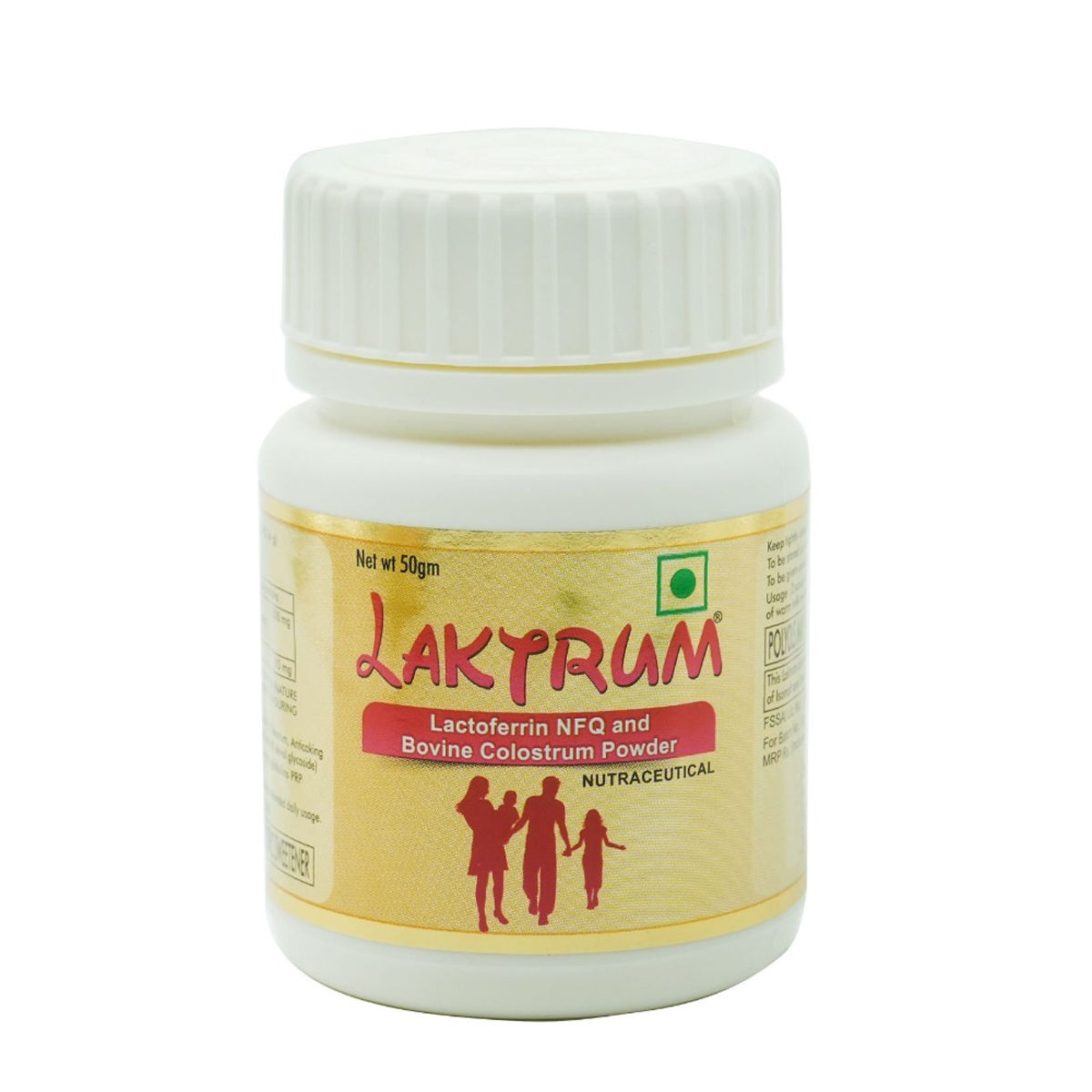Laktrum Powder 50 gm
₹463.5*
MRP ₹515
10% off
₹437.75*
MRP ₹515
15% CB
₹77.25 cashback(15%)
Free Delivery
With Circle membership
(Inclusive of all Taxes)
This offer price is valid on orders above ₹800. Apply coupon PHARMA10/PHARMA18 (excluding restricted items)
Know Your Delivery Time
Provide Delivery Location





Secure Payment

India's Most Trusted Pharmacy

Genuine Products
Composition :
Manufacturer/Marketer :
Consume Type :
Return Policy :
Expires on or after :
About Laktrum Powder
Laktrum Powder is used to boost immunity and protect the body from various infections caused by viruses, bacteria and fungi. An infection occurs when a microorganism enters the body and causes harm.
Laktrum Powder contains Colostrum and Lactoferrin NFQ. Colostrum strengthens the immune system and helps the body to fight various disease-causing agents. Lactoferrin NFQ is a protein that helps to regulate the absorption of iron into the body from the intestine. Thereby, it helps to treat low levels of iron in pregnant women and prevents blood infection in premature infants.
Take Laktrum Powder as advised by your doctor. Laktrum Powder is usually safe and does not cause any side effects. However, sometimes, Laktrum Powder may cause tiredness, constipation or diarrhoea. These side effects generally do not require medical attention and gradually resolve over time. However, if the side effects persist or worsen, please consult a doctor.
If you are allergic to Laktrum Powder or any other medicines, please tell your doctor. If you are pregnant or a nursing woman, please consult a doctor before starting Laktrum Powder. You are advised to give Laktrum Powder to children only if advised by a doctor. Let your doctor know if you are taking any other medications or herbal products before starting Laktrum Powder.
Uses of Laktrum Powder
Directions for Use
Medicinal Benefits
Laktrum Powder contains Colostrum and Lactoferrin NFQ. Colostrum strengthens the immune system and helps the body to fight various disease-causing agents. It is rich in antibodies that fight bacteria and viruses and treat different types of infections. Also, Colostrum improves gut (gastrointestinal tract) health. Lactoferrin NFQ is a protein that helps to regulate the absorption of iron into the body from the intestine. Thereby, it helps to treat low levels of iron in pregnant women and prevent blood infection in premature infants. Additionally, Lactoferrin NFQ possesses antibacterial and antiviral properties and, thus, protects the body from infections.
Side Effects of Laktrum Powder
- Diarrhoea
- Tiredness
- Constipation
Storage
Drug Warnings
If you are allergic to Laktrum Powder or any other medicines, please tell your doctor. If you are pregnant or breastfeeding, please consult a doctor before taking Laktrum Powder. You are recommended to avoid taking Laktrum Powder if you are allergic to milk or milk products. Laktrum Powder should be used in children only if advised by a doctor.
Therapeutic Class
Diet & Lifestyle Advise
Drink plenty of water to flush out the bacteria.
Certain fermented foods like cheese, yoghurt, kombucha, sauerkraut and kimchi can help to restore the good bacteria of the intestine.
Include fibre-rich foods, as they can be easily digested by your gut bacteria, which helps stimulate their growth.
Whole grains such as brown rice, whole grain bread should be included in your diet.
Habit Forming
How Laktrum Powder Works
What if I have taken an overdose of Laktrum Powder
Alcohol
Caution
The interaction of alcohol with Laktrum Powder is unknown. Talk to your doctor if you have any concerns.
Pregnancy
Caution
Please consult a doctor if you are pregnant or planning for pregnancy.
Breast Feeding
Caution
It is unknown whether Laktrum Powder is excreted in human milk. Therefore, please consult a doctor if you are breastfeeding.
Driving
Safe
Laktrum Powder usually does not affect your ability to drive or operate machinery.
Liver
Caution
Take Laktrum Powder with caution, especially if you have a history of liver diseases/conditions. The dose may be adjusted by your doctor as required.
Kidney
Caution
Take Laktrum Powder with caution, especially if you have a history of kidney diseases/conditions. The dose may be adjusted by your doctor as required.
Children
Caution
Laktrum Powder should be used in children only if advised by a doctor.
Country of origin
Manufacturer/Marketer address
Author Details
We provide you with authentic, trustworthy and relevant information
FAQs
Disclaimer
Customers Also Bought










